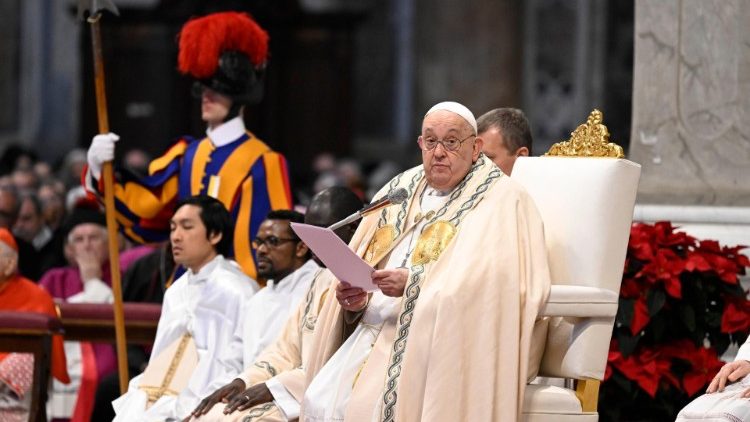By Philip Nwosu
Pope Francis has called on governments worldwide to put an end to the death penalty as a punishment for offences, especially as the measure does not give the victim an opportunity to make amends. The Pope made the comment at the celebration of the 2025 World Day of Peace, urging international financial organisations to also consider debt forgiveness for highly indebted poor countries as a means of alleviating poverty across the globe.
The Pope’s message was re-echoed by the Catholic Archbishop of Lagos, Most Reverend Adewale Martins, who addressed the press on the occasion of World Day of Peace, saying that there is a need for the establishment of a global fund to combat hunger and climate change.
Pope Francis made the appeal under the theme “Forgive us our trespasses: grant us your peace,” anchoring the message on three proposals aligned with the 2025 Jubilee Year, a biblical tradition centred on debt forgiveness and social justice.
The Pope reiterated his longstanding opposition to capital punishment, urging all nations to eliminate the practice.
His words: “I would like once more to propose a concrete gesture that can help foster the culture of life, namely the elimination of the death penalty in all nations. This penalty not only compromises the inviolability of life but eliminates every human hope of forgiveness and rehabilitation.”
The Pope’s appeal follows his 2018 revision of the Catholic Church’s Catechism, which declared the death penalty “inadmissible.” His call also comes just days after he issued an urgent plea on behalf of death row inmates in the United States.
At present, capital punishment remains legal in 27 U.S. states and over 50 countries worldwide, with an estimated 28,000 people currently on death row globally.
While speaking on debt forgiveness, Pope Francis also renewed his call for a new international mechanism to alleviate foreign debt, which now stands at approximately $313 trillion. He criticised the exploitation of poorer countries through debt arrangements that prioritise the markets of richer nations over human and natural resources.
“I have repeatedly stated that foreign debt has become a means of control whereby certain governments and private financial institutions of the richer countries unscrupulously exploit the human and natural resources of poorer countries,” the Pope stated.
He echoed Pope John Paul II’s historic appeal for substantial reductions or outright cancellations of international debt, which threatens the future of many nations.
The Pope proposed redirecting a fixed percentage of military spending to establish a global fund aimed at eradicating hunger, fostering sustainable development, and combating climate change.
“We need to work at eliminating every pretext that encourages young people to regard their future as hopeless or dominated by the thirst to avenge the blood of their dear ones,” he wrote.
While the Vatican has long championed these initiatives, the Pope emphasised their urgency in light of ongoing global conflicts and the 2025 Jubilee Year of the Church.
“The Jubilee is an event that inspires us to seek to establish the liberating justice of God in our world,” Pope Francis wrote.
The proposals have sparked renewed debate among global leaders and advocates for social justice, as the Pope’s message highlights the need for collective action to address systemic inequities and promote peace.
“In order to forgive others their trespasses and to offer them hope, we need to be filled with that same hope, the fruits of our experiences of God’s mercies.”
According to him, hope overflows in generosity and is free of calculation, making no hidden demands, with the aim of raising those who have fallen, healing broken hearts, and setting free those in bondage.
He said that “at the beginning of this Year of Grace, I would like to offer three proposals capable of restoring dignity to lives, enabling people to set out anew on the journey of hope.”
“In this way, the debt crisis can be overcome and all of us can once more realise that we are debtors whose debts have been forgiven.”
He renewed the appeal launched by Saint John Paul II on the occasion of the Great Jubilee of the Year 2000 to consider reducing substantially, if not cancelling outright, the international debt which threatens the future of many nations.
He appealed to more prosperous countries to forgive the debts of those nations that have no capacity to repay the amounts they owe.
A new financial framework must be devised to create a global charter based on solidarity and harmony between peoples, he suggested.
